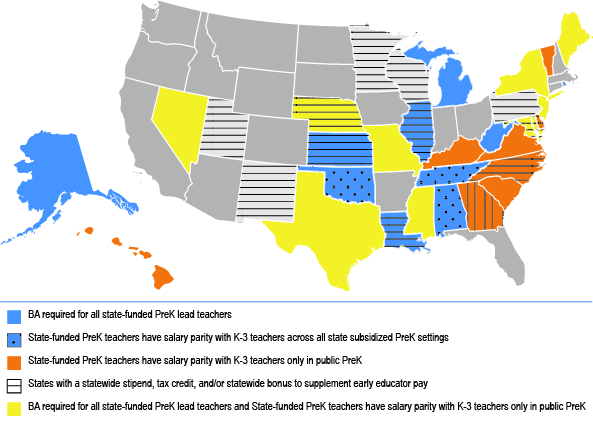
Practitioners, policymakers, and researchers agree that high quality early care and education (ECE) can support positive child outcomes, but depends on providers who are knowledgeable and adequately compensated. Experts from the National Academy of Sciences (NAS) panel on Transforming the ECE Workforce argue that the complexity of teaching very young children and the need for greater continuity of experiences between preschool and elementary school should inform education and compensation decisions. The panel also notes that increasing ECE teacher education requirements to match the levels required for elementary school teachers could professionalize the workforce, improve compensation, and thus lead to greater quality and less turnover among ECE teachers. The NAS panel recommended ECE teachers have bachelor’s degrees to promote professionalization and skills, while acknowledging studies on the association between ECE quality and teacher education have produced mixed findings.
Yet state standards for the minimum credentials vary widely, as do policies that relate to compensation for ECE teachers. State policymakers in the mid-Atlantic region have identified education and compensation for early care educators as a priority issue.
The challenges of ensuring ECE quality and compensating teachers adequately are evident across the country. In the most recent national survey of the ECE workforce, fewer than half of center-based preschool teachers had bachelor’s degrees (45 percent). The percentage was even lower for teachers of infants/toddlers and for home-based caregivers, both at 19 percent. ECE teachers are also among the lowest compensated educators, which presents a challenge in attracting and retaining highly qualified candidates. Their median earnings were less than $30,000 in 2015, well below those of K–12 teachers, which were more than $50,000 for the same period.
The map below¹ illustrates the diversity of state policies related to qualifications and compensation. Only a few states require a bachelor’s degree; others typically require a Child Development Associate (CDA) credential, associate’s degree, or specialized training in ECE. Some states have launched initiatives to equalize compensation for ECE and public elementary teachers with comparable education. These initiatives address the challenge of better-educated ECE teachers leaving the field for higher-paying jobs in elementary schools.

Increasing the education requirements and compensation for ECE teachers presents practical challenges. Current ECE teachers face barriers to obtaining a bachelor’s degree, such as the cost of further education, the time required for coursework, and logistical constraints in balancing work and schooling. Coupled with the mixed research evidence on the links between ECE teacher education levels and better outcomes for children, some have argued for professional development and credentialing rather than degrees. A recent report suggests further research is needed to support the NAS recommendation of increased education requirements.
The REL Mid-Atlantic’s research alliance on strengthening the early education continuum (SEEC) has partnered with the Delaware Department of Education, Office of Early Learning to share research evidence with stakeholders as they explore ways to raise credentials and compensation for the state’s ECE workforce. We’re looking at what other states are doing to increase education requirements and compensation for ECE teachers. We’re also providing research to support strategies for sharing data across agencies so Delaware can monitor their progress. We’re casting a wide net to tap expert advice and share what we are learning. Check out our recent webinar on research recommendations for addressing ECE teacher education and compensation issues. The SEEC alliance is pursuing a number of projects across the region, and we look forward to our continued partnerships with stakeholders to make a difference in improving the quality of ECE settings.
1. Data from the Early Childhood Workforce Index - 2018, Center for the Study of Child Care Employment.
Cross-posted from the REL Mid-Atlantic website.



